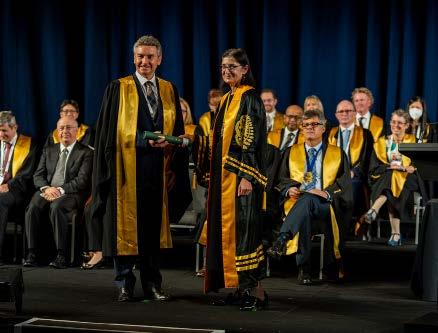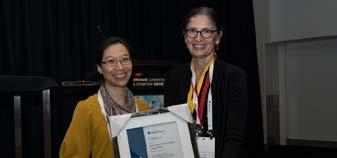
5 minute read
President’s message
As we get into the colder months of winter, we expect to see a growing number of COVID-19 infections and influenza. This is a stark reminder that the COVID-19 pandemic is far from over and that we have many issues that need to be addressed, including the impact of long COVID and its implications for ongoing medical support. As governments try to get the elective backlog under control, I fear that the already exhausted and burnt out healthcare workers’ health and wellbeing will continue to be adversely affected. We desperately need more staff, particularly nurses and other clinical professionals. We recently received notification from the Australian Department of Health’s Health Products Regulations Group, that there is an extreme shortage of non-ionic IV contrast (Omnipaque) for radiological investigations. Aotearoa New Zealand had adequate supply when this message was published. We wrote to our members advising that they comply with restrictions in requesting diagnostic imaging that requires IV contrast, such as angiograms, CT scans, intra-operative imaging, retrograde pyelography, ERCP, operative cholangiogram among other items. The current stock of IV contrast should be reserved for urgent, non-deferrable indications and surgeons should consider alternative investigation methods if appropriate for the indication. This is likely to mean deferral of some planned surgery until the supply is restored in hopefully, one to two months.
We encourage surgeons to make sure their Trainees are aware of these guidelines. In May we held our 90th RACS Annual Scientific Congress in Brisbane. It was a successful event that attracted more than 2600 attendees from more than 25 countries. It was great to see so many people in one place—enjoying catching up with friends and colleagues. I’m sure that like me, many of you were reminded of just how much we have missed in-person interaction with each other. We were able to have more meaningful conversations and make important connections.
Advertisement
We had a wide variety of presentations covering an interesting range of topics made by our Fellows, Trainees, overseas medical colleges, our specialty societies, and other healthcare practitioners. My special gratitude to my fellow presidents who joined us: Professor Mike Griffin, the president of the Royal College of Surgeons of Edinburgh, Professor Kean Ghee Lim, president of the College of Surgeons of Malaysia and Professor Johan Fagan, incoming president of the Colleges of Medicine of South Africa. I attended as many sessions as possible and particularly enjoyed the theme of sustainability. It covered topics from education, individual health and wellbeing to rural surgery in Australia and Aotearoa New Zealand, and also overseas in countries such as India, where the rural areas also suffer from a lack of infrastructure and support systems on a much larger scale than we experience in our countries. I especially want to acknowledge Associate Professor Rhea Liang, one of our Queensland-based Fellows, who stepped in at the last minute to cover for a plenary session presenter who couldn’t attend. I was impressed by how well Rhea delivered a highly polished talk at a moment’s notice. Thank you, Rhea. I was also honoured to welcome our new Fellows at the convocation ceremony. Congratulations to you all. I know how hard you’ve worked to get to where you are. I look forward to supporting you as you embark on this new phase of your career. I encourage you to become active members of the College—it is your College and you have the opportunity to make it a College that you can be proud of and help progress. During the RACS ASC, I also had the pleasure of launching our Building Respect Action Plan 2022, a five-year plan, which expands the College’s focus on addressing bullying, discrimination and sexual harassment, towards fostering professionalism and civility in surgery. For the past six years we have focused on building awareness and understanding to operate with respect in surgical workplaces. The new action plan focuses on supporting actions that encourage professional behaviours that keep teams performing at their best and keep patients safe. The plan sets out a program of work that aims to strengthen leadership and professionalism, increase cultural safety and diversity, address racism, support speaking up and providing feedback, and leverage collaborations and partnerships. We look forward to working with our members and health jurisdictions around Australia and Aotearoa New Zealand and supporting them to embrace and implement this new focus. My thanks also go to the congress conveners—Professor Chris Pyke, Professor Deborah Bailey, section conveners, Dr Liz McLeod, the congress coordinator, our keynote speakers and visitors, and our generous sponsors. Thanks to our staff who pulled this wonderful event together and spent many hours making sure everything was working well— from technology, communications, media, accommodation, and food services.
And thank you Brisbane for your warm hospitality. We look forward to the 2023 RACS ASC in Adelaide, South Australia. On a final note, I would like to thank you for sharing your thoughts and concerns—in support of and against—the proposed name change for the College. It is encouraging to see the high level of engagement this issue has generated. We will continue to give you the opportunity to share your views as we increase awareness of the proposal.

Dr Sally Langley President
J o i n u s f o r d i n n e r , m u s i c a n d a u c t i o n s a t t h e Victorian Surgeons
Charity Ball Saturday O c t o b e r 8 t h , 2 0 2 2 f r o m 7 p m
M e l b o u r n e C r i c k e t G r o u n d
T I C K E T S & I N F O R M A T I O N
h t t p s : / / s u r g e o n s . e v e n t s a i r . c o m / v i c b a l l 2 2 / v i c b a l l r e g








